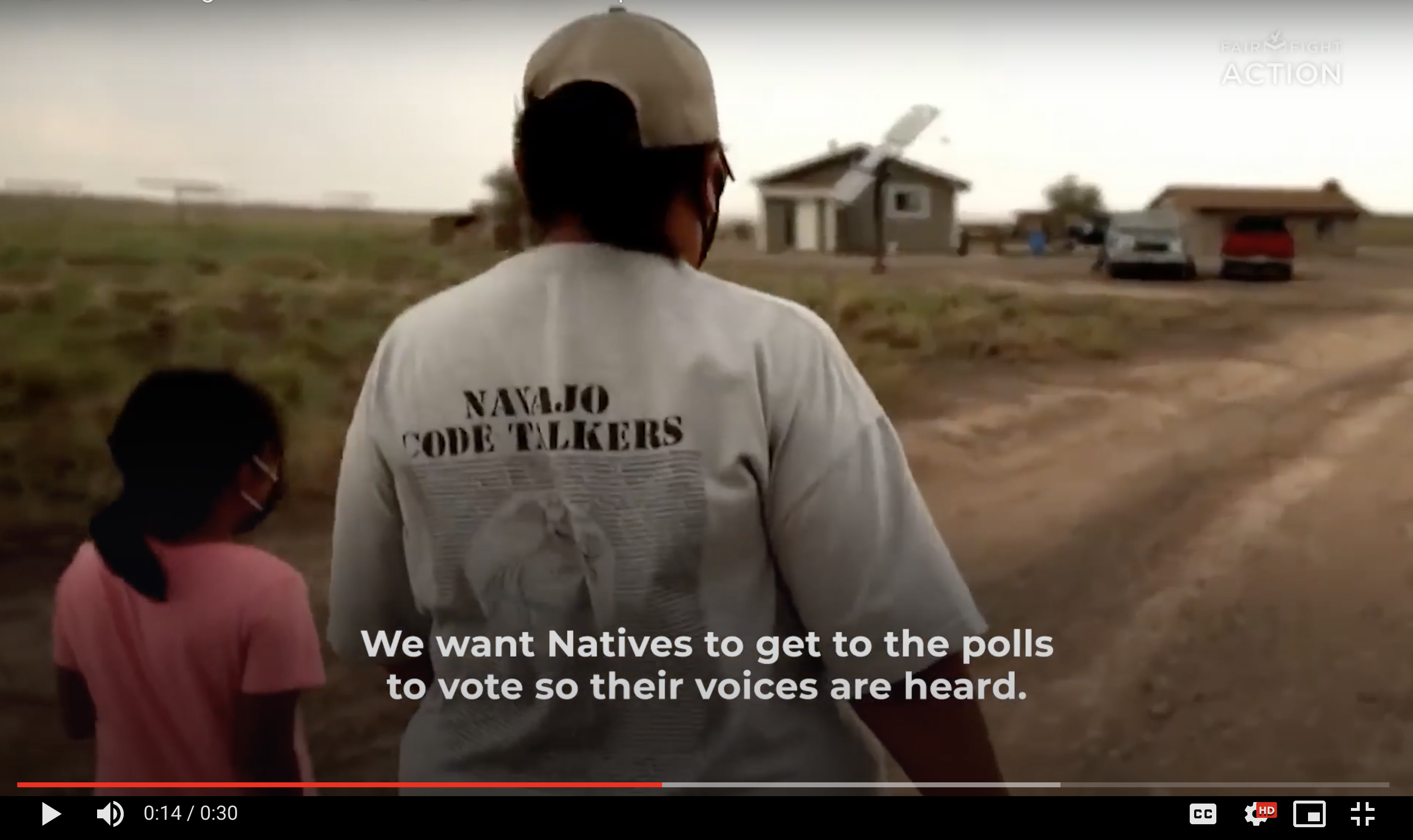
- Details
- By Native News Online Staff
MISSION, S.D. — Four Directions Native Vote and Fair Fight Action, two advocacy organizations that promote election protection, have released a 30-second video that encourages tribal citizens to call their elected officials in Congress to ask them to protect Native Americans' freedom to vote.
The advertisement features William “Snuffy” Main (Gros Ventre Tribe), Elveda Martinez (Walker River Paiute Tribe), Dallin Maybee (Northern Arapaho/Seneca Tribe) and Don Ragona (Matincock Tribe). Each contributes to the ad with a unique message.
Want more Native News? Get the free daily newsletter today.
“Elections have historic consequences,” is one of the many strong messages featured.
Four Directions Native Vote has been at the forefront of protecting the Native vote. Led by OJ Semans, the organization has worked hard to get out the Native vote and filed numerous court cases to ensure Native Americans have the right to vote.
“Native American Indians have never had equal access at the ballot box and with the recent Supreme Court ruling in Brnovich versus DNC, those lawsuits we won for equality are all in danger,” OJ Semans (Rosebud Sioux), co-director of Four Directions Native Vote said to Native News Online.
The ads will be aired in Alaska and Arizona to help sway Senators Kyrsten Sinema (D-AZ) and Lisa Murkowski (R-AK) to vote to pass the “For the People Act” and the John Lewis Voting Rights Advancement Act.
“It was the Native vote that helped elect Arizona U.S. Sen. Sinema and Alaska U.S. Sen. Murkowski, it is time for them to return the help in passing the Native American Voting Rights Act and the John Lewis Voting Rights Advancement Act/The Peoples Act,” Semans said.
The Native American Voting Rights Act of 2021 (NAVRA) was introduced this month by Rep. Tom Cole (R-OK) and Rep. Sharice Davids (D-KS). NAVRA would enact key measures, such as allowing Tribes to specify the number and locations of requested voter registration sites, drop boxes and polling locations on Tribal lands, and authorizing Tribal ID cards for voting purposes. The bill would also help establish state-level Native American voting task forces to address the unique voting issues faced by voters on Tribal lands by authorizing a $10 million Native American Voting Rights Task Force grant program. It would also require prior Tribal notice and consent before States and precincts could remove, consolidate, or otherwise reduce access to voting locations on Tribal lands.
The For the People Act (H.R.1 and Senate S.1) addresses issues related to election issues, such as voter access, election integrity and security, campaign finances and ethics for the three branches of government. The bill passed the House of Representatives on March 11, 2021. On August 11, the bill was placed on the Senate Legislative Calendar.
The John Lewis Voting Rights Advancement Act (H.R.4) deals with racial discrimination issues that discourages people of color to vote. Named for legendary Congressman John Lewis (D-GA) and civil rights leader, who passed away last year, the bill would strengthen the Voting Rights Act of 1965 because it would provide provisions weakened by the Supreme Court during the past decade. It would make it more difficult from states to enact voter restrictive legislation. The House version passed this past Tuesday along party lines. It faces an uphill battle in the U.S. Senate, which may take up debate in September.
The ad will run for four weeks.
More Stories Like This
Native News Weekly (August 25, 2024): D.C. BriefsTwo Native Americans Named to Democratic Congressional Campaign Committee's“Red to Blue” Program
Cheyenne River Youth Project Hosts Young Women’s Winter Camp as Part of Lakota Culture Internship
Showing Up When It Matters: Flanagan’s Response to Minnesota’s Immigration Crisis
Monday Morning: (February 23, 2026): Articles You May Have Missed This Past Weekend
Help us defend tribal sovereignty.
At Native News Online, our mission is rooted in telling the stories that strengthen sovereignty and uplift Indigenous voices — not just at year’s end, but every single day.
Because of your generosity last year, we were able to keep our reporters on the ground in tribal communities, at national gatherings and in the halls of Congress — covering the issues that matter most to Indian Country: sovereignty, culture, education, health and economic opportunity.
That support sustained us through a tough year in 2025. Now, as we look to the year ahead, we need your help right now to ensure warrior journalism remains strong — reporting that defends tribal sovereignty, amplifies Native truth, and holds power accountable.
 The stakes couldn't be higher. Your support keeps Native voices heard, Native stories told and Native sovereignty defended.
The stakes couldn't be higher. Your support keeps Native voices heard, Native stories told and Native sovereignty defended.
Stand with Warrior Journalism today.
Levi Rickert (Potawatomi), Editor & Publisher

